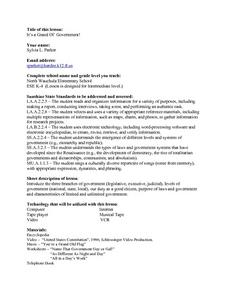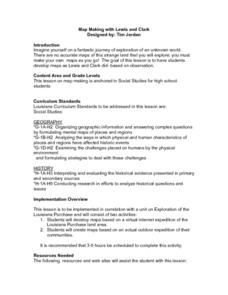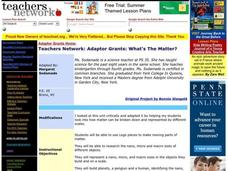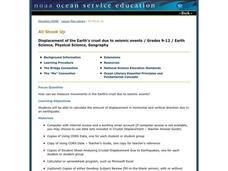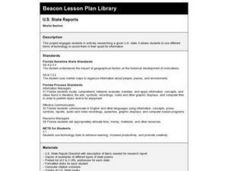Curated OER
The Ups and Downs of Occupations
Students research Internet sites to identify the latest employment and occupation trends. They discuss and define career terms that important to employment. They report the findings of their research on the occupation of their choice.
Curated OER
It's a Grand Ol' Government!
Students discuss the three branches of government and the different levels. They talk about the purpose of laws and use the Internet to locate information about governments. They watch the video, "United States Constitution" and look up...
Curated OER
Unity Versus Diversity
Young scholars explore the 50 State Quarters program and how it represents diversity and unity of the United States. In pairs, they examine quarter designs to gain information about the culture of each state. Students create charts to...
Curated OER
Map Making with Lewis and Clark
Students develop maps based on a virtual internet expedition of The Louisiana Purchase land area. They create the maps based on an actual outdoor expedition of their communities. Student create two maps, one based on the Louisiana...
Curated OER
Jamestown Journey Part 4
Fourth graders review their prior knowledge from the previous lessons of this unit on Jamestown. After reading a novel, they examine and discuss the life of Pocahontas. Using the internet, they answer comprehension questions and write...
Curated OER
Famous People of the Gold Rush
Fourth graders research a famous person from the Gold Rush era. Using the Internet, they take notes from creditable websites and write their rough drafts of their paper. They use peer editing to check for spelling and grammar errors. ...
Curated OER
Earth Science: In Depth Look at Earthquakes
Students engage in an interactive Internet lesson covering the reasons and results of earthquakes. After reading eyewitness accounts and viewing animations, they use seismograms to measure and locate the epicenters. In an ongoing study,...
Curated OER
What's The Matter
Students identify and describe the different stages of matter. In groups, the use lego pieces to represent the moving parts of matter. They use the internet to research the meanings of nano, micro and macro sizes. They also use the...
Curated OER
Affirmative Action
Learners explore policies concerning affirmative action. After reading affirmative action handouts, students use the internet and other resources to research information about affirmative action laws, court cases, and arguments. They...
Curated OER
Test Your Research Skills-- You Either Know It Or You Don't! 4
For this research worksheet, students use Internet searches or reference books to answer 15 questions on a variety of subjects.
Curated OER
Spotlight on Australia: Research Skills
In this Australia research instructional activity, students use the Internet or library to find answers to a set of questions about Australia. Answers are included. Worksheet gives a reference web site for additional activities.
Curated OER
Famous Britons-- When Were They Born?
In this social studies worksheet, students examine the 8 names of famous people from Great Britain. Using Internet research or reference books, students list the famous Britons in the order in which they were born, starting with the...
Curated OER
Beyond the Earth Part II
Students explore the solar system. In this solar system lesson, students use Internet and print resources to research a component of the solar system. Students create travel brochures based on their research findings.
Curated OER
Life in Space: International Space Station
Students explore the potential challenges of living in space. In this investigative lesson students search the Internet to locate 16 nations that are working together to build the Independent Space Station, then they divide into groups...
Curated OER
The People Next Door
Young scholars explore the culture and tradition of neighboring countries. In this geography lesson, students use travel brochures, reference materials, and Internet sites to investigate the business, fashion, language, and entertainment...
Curated OER
When You're Hot, You're Not!!
Students investigate volcanoes. In this landforms lesson, students locate two volcanoes on a world map. Students compare and contrast the types of volcanoes by using various Internet sites.
Curated OER
Classifying Seashells
Third graders practice classifying seashells. In this seashell classification lesson, 3rd graders listen to a guest speaker talk about collecting seashells. They participate in a discussion on the characteristics by which seashells are...
Curated OER
It's Not Your Fault
Young scholars study the San Andreas Fault, calculate its movements, and compare the movements on both sides. In this earthquake lesson students use the Internet to track movement, and calculate movement using a spreadsheet.
Curated OER
All Shook Up
Students calculate the amount of displacement after an earthquake. In this seismic event lesson students research the Internet, and fill out a CORS data sheet.
Curated OER
Refrigerator to Renoir: Ten Great Art Lessons on the Net
Every learner can be an artist with a series of activities designed to access their creativity. With reference links and instructional ideas, this art resource is sure to enrich your class and bring new ideas to even your most reluctant...
Curated OER
Raindrops Keep Burning On My head
Students investigate the effects and causes of acid rain. They test pH of household items to familiarize themselves with pH scale and compare that information with acid rain solutions. They investigate impact of acid rain via internet...
Curated OER
Up in the Sky
First graders associate events and objects with day or night. They create a word bank and use is as a reference to create sentences about the sun. They conduct sun-themed experiments and art projects.
Curated OER
U.S. State Reports
Students conduct Internet research on a chosen U.S. state. They include information about the history, climate, geography, symbols, and tourist attractions of their state, and write an original poem.
Curated OER
D-Day: A Call to Courage
Students examine the events surrounding the D-Day invasion. They watch and discuss a documentary, answer discussion questions, conduct Internet research, simulate war correspondents going ashore, and create a multimedia presentation.



